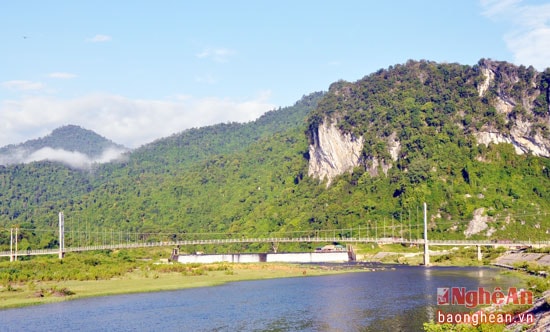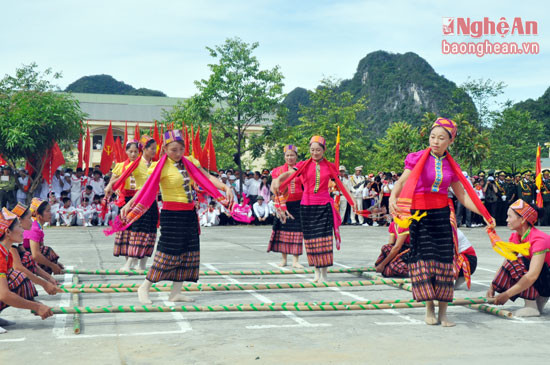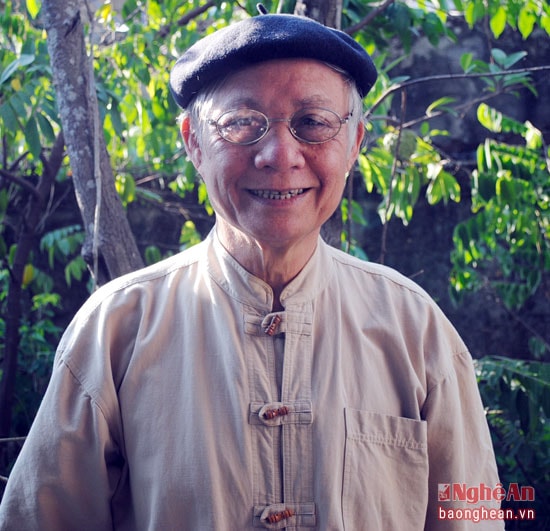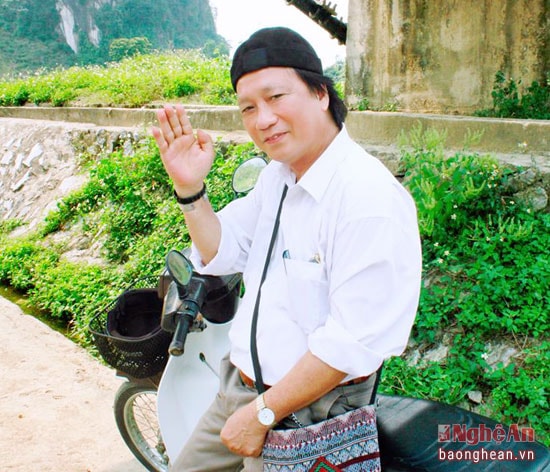'Voice of the heart' of Con Cuong mountain region
(Baonghean.vn) - The people of Con Cuong are always proud of their homeland, which has a rich cultural tradition and is blessed with many beautiful landscapes by nature, and is the origin of captivating songs and melodies.
When writing about the land of Thanh Nam (the old name of Con Cuong), the ancients said: "The mountains are not high, the water is not deep/ The landscape is painted in one color by someone skillfully". Like dotted strokes, the two verses evoke the beauty and charm of the idyllic landscape painted by the skillful and talented hands of nature.
 |
| The beauty of Con Cuong mountains and rivers |
The beauty of the “One-color landscape painting” is the source of nourishment for the souls and emotions of the people of the homeland throughout history. That is, the beauty of the mountains and rivers and the villages has given the people here abundant inspiration, an easily moved soul. The children of the village sing passionate melodies, resounding songs to praise the beautiful scenery.
Going to the West during festivals, we often hear familiar songs about mountains, forests, and villages. And every time we talk about these songs, people often express their gratitude and respect for famous musicians such as Luong Tuyen, Tran Vuong and Le Hoang. All three of these authors are people who are closely attached to the land of Con Cuong.
 |
| Cruise to see the beautiful scenery of Giang River - Pu Mat. |
The first time I went to Con Cuong, I enjoyed the vibrant and lively melodies of the songs: “Xang khan festival”, “First lullaby”, “Lack of rhythm of the flute”, “Xen ban xen muong”, “Day festival” and “Am dieu Tang boang bu”. When asked about the author, many people were sad, because at that time, musician Luong Tuyen (1955-2008) had just returned to “Muong Then”, leaving a big void in the hearts of the people of the Muong villages.
He passed away but his “heartfelt voice” still remains with the ethnic minorities in the highlands, his reputation still lives on in the mountains and forests of his homeland. It is known that the late musician Luong Tuyen was born and raised in Mon Son, a fertile countryside with a famous song for generations: “Muong Qua Rice/ Giang River Fish”. The son of that Thai ethnic village once participated in artistic activities at Group 559 (Truong Son), bringing songs and voices to encourage the spirit of his comrades and teammates on extremely arduous marches and battles.
 |
| Thai people in Con Cuong celebrate festival. |
After leaving the army and returning to his hometown, he participated in the village cultural and artistic movement, became a district cultural officer, and then became Deputy Director of the Provincial Cultural and Information Center. Since childhood, the folk songs, folk dances and folk songs of his hometown have become the spiritual milk that nurtured Luong Tuyen's artistic soul. When he grew up, he wrote songs imbued with the sounds of the mountains and forests.
The other two are musicians Tran Vuong and Le Hoang, whom I have been fortunate to meet many times. The special thing about musician Tran Vuong is that he was not born and raised in Con Cuong, but his hometown is in Nam Cuong commune (Nam Dan) - the downstream of the Lam river.
But it seems that his life was born for the mountains and forests, because he taught Music at Nghe An Mountainous Pedagogical School, then Head of the Cultural Department of Con Cuong District, but what people know him for are the songs imbued with the breath of the mountains and forests. Every time people mention Tran Vuong, they often mention "lifetime" songs such as "Cay banyan Con Chua", "Trang ngan", "Cay khen be", "Em di chau vuon rung", "Rung xuan nho Bac", "Mien tay que ta"...
 |
| Musician Tran Vuong. |
Tran Vuong's music is easy to remember and memorize, because the lyrics, melody and rhythm are familiar, rich in imagery and warmly received. Now, he is quite old and no longer has the strength to wander around the villages to listen to the breath of life, but musician Tran Vuong still follows every step of his homeland and rejoices in the joy of the villages' prosperity.
As for musician Le Hoang (1957), his soul seems to be quite young compared to his 60 years of age. In any event, from weddings, holidays or festivals, wherever he is present, everyone around becomes more excited, the joy seems to increase after his passionate songs. At that age, he is still enthusiastic about traveling, leaving his footprints throughout the villages, expanding his exchanges and meetings to "absorb" the quintessence of life.
At the age of 20, he left his village to study medicine and then returned to work at Con Cuong District Hospital. During his trips to the villages to examine and treat patients, he realized and was constantly troubled by the fact that his fellow countrymen were still superstitious. With his concerns and his passion and natural talent, he decided to put his feelings into musical notes so that people would have more faith.
 |
| Musician Le Hoang (Photo: Lao Thanh Chuong). |
More than anyone else, musician Le Hoang knows the respect and gratitude of the people of all ethnic groups towards President Ho Chi Minh, so in his compositions, he often expresses the feelings of the people when they think of him. And that is also the reason why he has many songs about Uncle Ho such as: "The village thanks Uncle Ho", "Uncle's words still resonate in the village's heart", "Uncle's thanks song", "The stream misses Uncle Ho"...
Last year, Con Cuong district released a music DVD with the theme “Con Cuong Green Forest” based on a collection of typical songs about the homeland written by musicians Luong Tuyen, Tran Vuong and Le Hoang. These are “slices” of landscape and life but are enough to evoke the tradition and beauty of the ancient Tra Lan mountains and rivers.
| RELATED NEWS |
|---|
